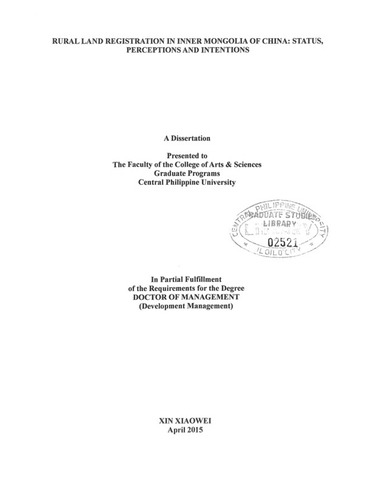Rural land registration in Inner Mongolia of China: Status, perceptions and intentions
| dc.contributor.adviser | David, Fely P. | |
| dc.contributor.author | Xin, Xiaowei | |
| dc.coverage.spatial | Inner Mongolia | en_US |
| dc.coverage.spatial | China | en_US |
| dc.date.accessioned | 2021-06-10T05:49:21Z | |
| dc.date.available | 2021-06-10T05:49:21Z | |
| dc.date.issued | 2015 | |
| dc.identifier.citation | Xin, X. (2015). Rural land registration in Inner Mongolia of China: Status, perceptions and intentions (Unpublished Doctoral dissertation). Central Philippine University, Jaro, Iloilo City. | en_US |
| dc.identifier.uri | https://hdl.handle.net/20.500.12852/1010 | |
| dc.description | Abstract only | en_US |
| dc.description.abstract | This study was conducted to determine the relationship between attitude towards the requirements for registration, registration status, and intention to register their land, among farmers in Inner Mongolia. Specifically, the study sought to: 1) describe the respondents’ land characteristics in terms of size, length of right, products, original owner and location; 2) determine the respondents’ family characteristics in terms of size, number of farm workers and income; 3) determine the respondents’ knowledge about land registration; 4) determine the respondents’ attitude towards the requirements for land registration, in terms of reasons, expectation of land laws and policies, preferences for location; 5) determine the registration status of the land being tilled by the respondents; 6) determine if there is a relationship between land characteristics and the respondents’ knowledge; between knowledge and land registration status; between land characteristics and respondents’ attitude towards the registration requirements; between land characteristics and land registration status in land; between attitude towards the registration requirements and land registration status in land; between family characteristics and attitude ; between family characteristics and land registration status in land. This study is descriptive-correlation study which employed one-shot survey design. The respondents of this study were selected farmers in Inner Mongolia. The computed sample size of 397 was drawn through stratified random sampling. Aar researcher-made questionnaire was used to collect the data through personal interview of the respondents. The Cramer’s V and Chi-square tests were used to analyze relationships between variables, while frequency distributions were used to describe the respondents’ personal and land-related characteristics. The data were transformed to codes to facilitate computer processing and were processed through the Statistical package for the Social Sciences (SPSS) 17.0 software. The data show that the majority (72 percent) have been operating their land for 50 years. The most common product planted in their land is cotton. Most of the respondents were individual farmers residing in the village and they with their family with four members. At least half of them were earning 2,999 Yuan or less per month… At least half of the respondents knew about the reasons for land conflict and the expectation of land laws and policies and at least half of them obtained information about land registrations from television. The majority of them expressed willingness to register their land. The study further showed no significant relationship between land characteristics and the respondents’ knowledge about land registration, and between knowledge and land registration status. On the other hand, a significant relationship was found between land characteristics of products, and expectation of land laws and policies, but none for others... A significant relationship was also found between land characteristics, such as land size, original owner and location, and preferences for location. but none for length of right and kind of products produced. Moreover, a significant relationship was found between land characteristics of products, and land registration status, between attitude towards the requirement, and expectation of land laws and policies, and land registration status, between family characteristics in terms of size and number of farm workers, and reasons and expectation of land laws and policies; between family characteristics and preferences for location; between family characteristics in terms of size and number of farm workers, and land registration status. | en_US |
| dc.format.extent | xi, 113 leaves | en_US |
| dc.language.iso | en | en_US |
| dc.rights | Attribution-NonCommercial-NoDerivs 3.0 Philippines | * |
| dc.rights.uri | http://creativecommons.org/licenses/by-nc-nd/3.0/ph/ | * |
| dc.subject.ddc | GSL Theses 658.072 X47 | en_US |
| dc.subject.lcsh | Rural conditions | en_US |
| dc.subject.lcsh | Farmers | en_US |
| dc.subject.lcsh | Land titles | en_US |
| dc.subject.lcsh | Land titles--Registration and transfer | en_US |
| dc.subject.lcsh | China--Inner Mongolia | en_US |
| dc.subject.lcsh | China | en_US |
| dc.subject.lcsh | Land use, Rural | en_US |
| dc.subject.lcsh | Farm life | en_US |
| dc.title | Rural land registration in Inner Mongolia of China: Status, perceptions and intentions | en_US |
| dc.type | Dissertation | en_US |
| dc.description.bibliographicalreferences | Includes bibliographical references | en_US |
| dc.contributor.chair | Illenberger, Anita U. | |
| dc.contributor.committeemember | Gumban, Gynnyn G. | |
| dc.contributor.committeemember | Dusaran, Reynaldo N. | |
| dc.contributor.committeemember | Delicana, Lilia A. | |
| dc.contributor.committeemember | Chin, Fely P. | |
| dc.contributor.department | School of Graduate Studies | en_US |
| dc.description.degree | Doctor of Management major in Development Management | en_US |



